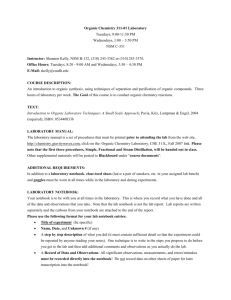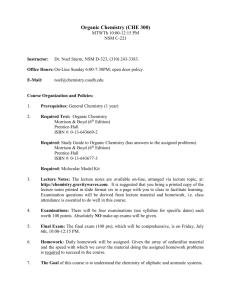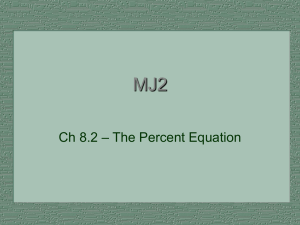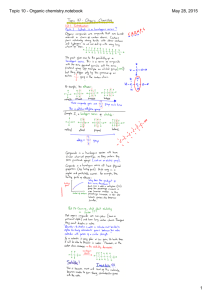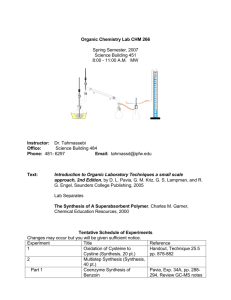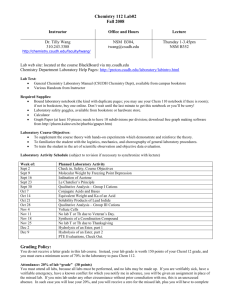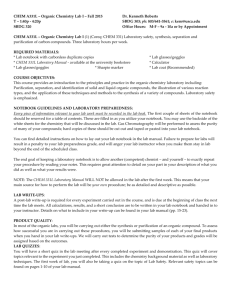Organic Chemistry 311-01 and
advertisement
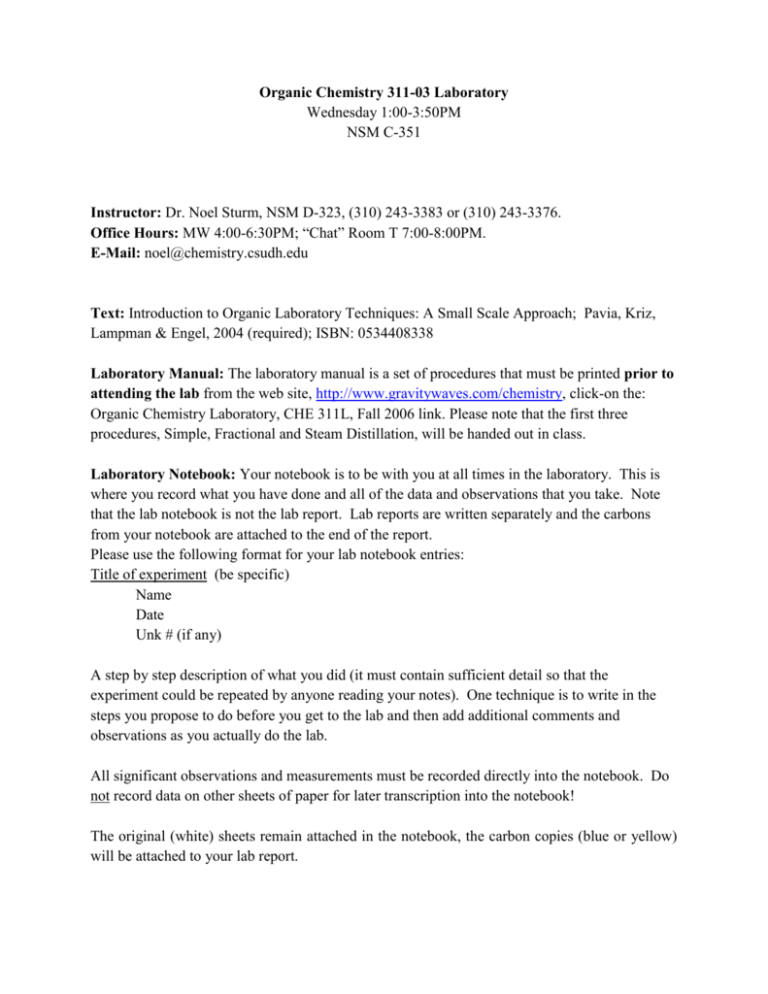
Organic Chemistry 311-03 Laboratory Wednesday 1:00-3:50PM NSM C-351 Instructor: Dr. Noel Sturm, NSM D-323, (310) 243-3383 or (310) 243-3376. Office Hours: MW 4:00-6:30PM; “Chat” Room T 7:00-8:00PM. E-Mail: noel@chemistry.csudh.edu Text: Introduction to Organic Laboratory Techniques: A Small Scale Approach; Pavia, Kriz, Lampman & Engel, 2004 (required); ISBN: 0534408338 Laboratory Manual: The laboratory manual is a set of procedures that must be printed prior to attending the lab from the web site, http://www.gravitywaves.com/chemistry, click-on the: Organic Chemistry Laboratory, CHE 311L, Fall 2006 link. Please note that the first three procedures, Simple, Fractional and Steam Distillation, will be handed out in class. Laboratory Notebook: Your notebook is to be with you at all times in the laboratory. This is where you record what you have done and all of the data and observations that you take. Note that the lab notebook is not the lab report. Lab reports are written separately and the carbons from your notebook are attached to the end of the report. Please use the following format for your lab notebook entries: Title of experiment (be specific) Name Date Unk # (if any) A step by step description of what you did (it must contain sufficient detail so that the experiment could be repeated by anyone reading your notes). One technique is to write in the steps you propose to do before you get to the lab and then add additional comments and observations as you actually do the lab. All significant observations and measurements must be recorded directly into the notebook. Do not record data on other sheets of paper for later transcription into the notebook! The original (white) sheets remain attached in the notebook, the carbon copies (blue or yellow) will be attached to your lab report. Laboratory Reports: Will be due the Wednesday following the conclusion of an experiment (i.e. Simple Distillation Report is Due 9/13). Each report will be worth 20 pts, for a total of 200 pts from all laboratory experiments (10). Please note that lab reports are not written in the lab notebook, but are separate requirements. You will be given explicit instruction, see lab exercises at http://www.gravitywaves.com/chemistry, about what each lab report is to contain. Report must be typed and should include the following: 1. Date 2. Title of Experiment 3. Summary of Experimental Procedure used. 4. Observations / Data (also include a copy taken directly from your laboratory notebook). 5. Graphs, Calculations, Exercises or other activities as per your laboratory manual. Interpretation of Results and the Report: These sheets found on the web site and tell you what kind(s) of data, calculations, graphs etc. need to be included in your laboratory report for any given experiment. Practicum: To be discussed later, will be a laboratory test and is worth 100 pts. Quiz: Will cover material from all of the laboratories (100 pts). We will discuss this as we proceed. This is not something to worry about, instead concentrate on your laboratory work and subsequent lab reports. Course Description: Techniques of separation and purification of organic compounds. Introduction to organic synthesis. Three hours of laboratory per week. The Goal of this course is to conduct organic chemistry reactions. Grading Criteria: Letter grade will be based on the following system: Grade A B+ BC D+ F Percentages 100-91 88-87 80-79 76-71 68-67 59-0 Grade AB C+ CD Percentages 90-89 86-81 78-77 70-69 66-60 Academic Integrity Statement: A university is a community of learners bonded together by the search for knowledge; the pursuit of personal, social, cultural, physical, and intellectual development; and the desire for the liberating effects of an advanced education. California State University, Dominguez Hills (CSUDH) has a culture--an academic culture--shared with other universities and colleges across the nation. Integral to that culture is a set of values such as academic freedom, dedication to teaching and learning, diversity, civility toward others, and academic integrity. Academic integrity is of central importance in the university community and involves committed allegiance to the values, the principles, and the code of behavior held to be central in that community. Integrity concerns honesty and implies being truthful, fair, and free from lies, fraud and deceit.
